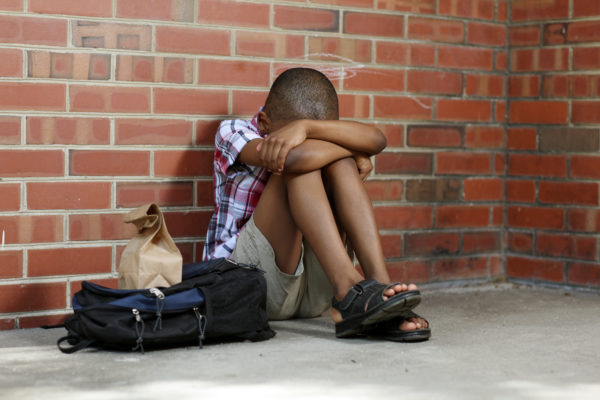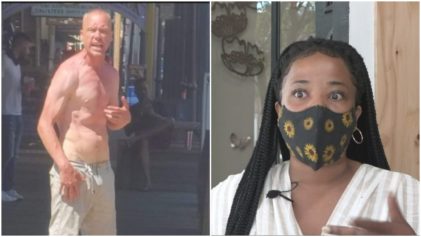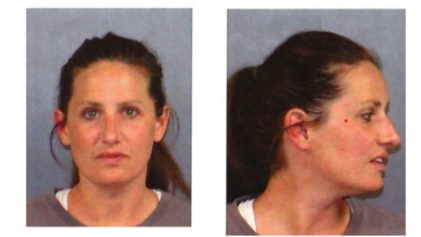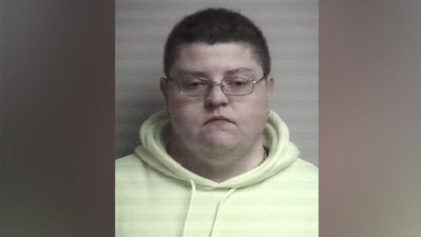Black youth across Britain are resorting to drastic measures to avoid being subjected to racial abuse, according to a new report by a national child protection group.
The latest study by the National Society for the Prevention of Cruelty to Children (NSPCC) found that police recorded a whopping 10,571 racially-motivated hate crimes against children — or 29 per day — in 2017-18, CNN reported. Now experts say kids as young as 10 are lightening their skin in an effort to avoid being targets of the racist harassment.

In 2017-18, U.K. police recorded a total number of 10,571 racially-motivated crimes against children. (Getty Images)
“I’ve been bullied ever since I started school,” one 10-year-old girl said in a statement provided by the charity. “The bullies call me nasty names, and it makes me feel so ashamed. My friends won’t hang out with me anymore because people started asking why they were friends with someone who had dirty skin.” The charity offered no evidence that this unnamed girl’s reported step of trying to lighten her skin was part of a wider trend.
Even though she was born in the U.K., the little girl said bullies tell her to “go back to your home country.”
“I’ve tried to make my face whiter before using makeup so that I can fit in,” she admitted. “I just want to enjoy going to school.”
Minors, including toddlers and babies, are also among the targeted, as the rate of hate crimes against minority continues to rise. According to the report, the total number of recorded race-based attacks against minors in the U.K. saw a 22 percent increase between 2015 and 2018, growing at a rate of almost 1,000 new crimes each year.
The attacks not only include physical threats, but verbal harassment as well.
“Childhood bullying of this nature can cause long-term emotional harm to children and can create further divisions in our society,” John Cameron, who heads the NSPCC’s Childline service, told CNN.
Using Freedom of Information requests, the NSPCC was able to obtain data on hate crimes against children from several police agencies across Britain. The requests were sent to every police force in the U.K., to which 38 out of the 42 agencies responded.
The spike in hate crimes happened not long after the Brexit vote of 2016, which left the nation deeply divided. More than 70,000 hate crimes were recorded in Britain and Wales in 2017-18, increasing 14 percent from the previous year.
A 16-year-old Muslim girl told the NSPCC: “People call me a terrorist and keep telling me to go back to where I came from. I dress in traditional Muslim clothes and I think it singles me out. I usually just put my head down and get on with it but it’s getting to the point now where I genuinely feel like I might get attacked.”
On Wednesday, the Liverpool Echo reported that an 11-year-old Black child was called a “slave” and the-N word by students at the school he recently transferred to.
“It makes me feel kind of sad because I am just trying to make friends,” the boy, Ashley Davies, told the paper. “I’ve had loads of comments from people who don’t want me there. When I wake up in the morning, it’s like a burden.”
The report noted that while crimes based on a person’s gender, religion, sexual and gender orientations are also on the rise, racially-motivated attacks still account for a large chunk of the U.K.’s hate crimes. Crimes based on disability rose 30 percent between 2016 and 2018, while religion-based attacks increased 40 percent, according to the report.
As police struggle to get a hold on the racist attacks, children are jeopardizing their looks, and health, in order to protect themselves.
“Over the eight years that I’ve volunteered as a counselor it is just as heartbreaking every single time a child tells you they wish they looked different,” said Atiyah Wazir, a counselor for the Childline service.
“I want every child to know that this bullying is not OK,” Wazir added, “that they have nothing to be ashamed of, and Childline is always here to listen.”


